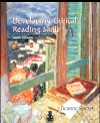 |  Developing Critical Reading Skills, 6/e Deanne Spears,
City College of San Francisco
Exercises
Online Exercises- What are some other kinds of figurative language besides metaphor, simile,
and personification? The website listed below offers a brief overview of figures
of speech, a list of a few other types of figurative language, and the text
of John F. Kennedy's Inaugural Address delivered in Washington, D.C., on January
20, 1961. Communications students often study this speech as a masterpiece
of stirring rhetoric. See how many figures of speech you can identify in it.
The address is online.matc.edu/eng-201/figures.htm.
- The National Council of Teachers of English (NCTE) sponsors an open forum
for discussing and sharing examples of doublespeak. Once you subscribe (it's
free), you can join the fun and perhaps contribute your own examples of misused
language designed to hoodwink the unwary reader. The address is www.ncte.org/lists/doublespeak/.
- What are social and cultural watchdogs saying about political correctness
on American college and university campuses? How serious a threat to academic
freedom is the PC movement? Should colleges substitute the word "first-year
student" for "freshman"? Should a college student have the
right to censure a professor for using the word "niggardly." (The
word means "stingy" and does not in any way refer to a racial epithet.)
See for yourself what teachers and students are saying about the PC movement
by doing an Internet search. Using Google, I typed in "political correctness"
and "colleges" and found a great deal of information. A good overview
of the problem can be found at www.gofast.org/argos-spring-1998/article2.htm.
Another good source, which requires you to subscribe online if you are not
a regular subscriber to the print version, is sponsored by the Chronicle of
Higher Education. Its address is chronicle.com/weekly/v45/i23/23a01201.htm.
This site also provides many useful links so that you can explore the subject
further.
|
|



 2003 McGraw-Hill Higher Education
2003 McGraw-Hill Higher Education